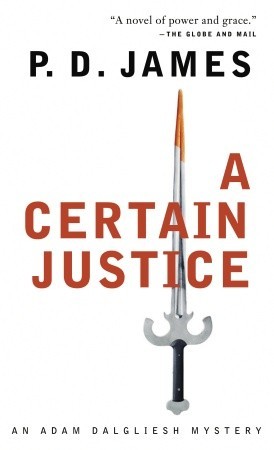The grand theme of P.D. James’s work is man and his overwhelming sense of rootlessness, anxiety, and guilt in the knowledge of a crime unknown and a punishment outwardly denied in the post-Christian era, though inwardly anticipated. Especially in the last decade or so, James has moved far beyond Dame Agatha Christie, delving deeply into the psychological and theological realm of Dostoyevsky.
No longer a mystery writer but a novelist who so expertly employs the mystery genre that we hardly notice the intricacies of plot, the procedure of detection, and the uncovering of clues, James has achieved in A Certain Justice the rewards of more than 35 years of hard work.
The plot turns on the murder of a criminal lawyer known for her coldblooded approach to her craft and her reputation for getting obviously guilty criminals off the judicial hook. Venetia Aldridge is the most fully developed version of a character type James has evolved over the years: a career woman (typically unmarried, in this case divorced) who takes what purpose, passion, and meaning she is capable of feeling from her status as a leading member of the bar. Like Garry Ashe, the murderer she is defending, Aldridge is incapable of love—a recurring theme throughout the novel, underscoring the sense of isolation that many of the novel’s characters feel. Ashe, as Aldridge well knows, is a “psychopath,” a convenient term devised by our therapeutic society to “explain, categorize and define in statute law” the mystery of human evil. As Aldridge’s murder approaches, Ashe, freed by his counsel’s lawyerly skills, takes up with her unloved —and unwanted —daughter, thus precipitating a second murder and the main action of the novel, which is the search for Ashe.
It is evident from A Certain Justice that the inhabitants of James’s postmodern world are adrift as the struggle to become a “full human being” becomes increasingly precarious. Some of them grasp for meaning in a career or hobby, while most are lonely and isolated, recoiling in horror from the ugly reality of their society. “What is happening to us, to our world?” gasps one character. Adam Dalgliesh, sometime poet, connoisseur of church architecture, now chief of a Scotland Yard unit entrusted with the responsibility for particularly “sensitive” crimes, once again serves as the novel’s center of gravity. Dalgliesh has come a long way from solving genteel murders in country manors; the thoughtful, introspective son of a country parish priest, no stranger himself to personal tragedy, has steadily evolved through James’s most fully realized mystery novels, A Taste for Death (1986), Devices and Desires (1990), and Original Sin (1995). His able companion is Inspector Kate Miskin, the obverse of James’s career woman and an intelligent admirer of her boss. It is Kate, finally, with help from Father Presteign—the only character in the novel besides Dalgliesh capable of maintaining a position in the shifting postmodern sands—who affirms the possibility of justice and the freedom of the human will. “Even the bad dreams,” Kate assures Octavia, Venetia’s unloved daughter, “fade in time.”
[A Certain Justice, by P.D. James (New York; Alfred A. Knopf) 364 pp., $25.00]

Leave a Reply